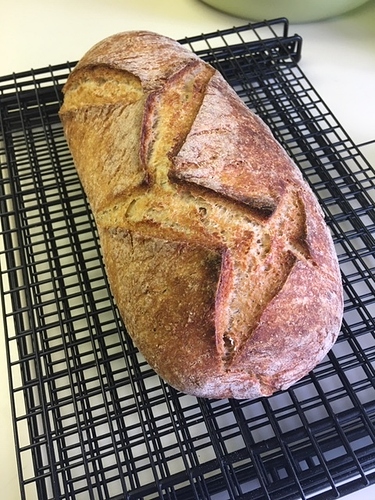Are there any adjustments to be made to a recipe when using whole wheat flour in place of white flour?
To get the same dough feel, you usually need more water. So a 500g whole grain flour and 400g water dough may feel as wet as a 500g bread flour and 340g water dough. It’s wheat variety and milling style dependent, that’s just a random example.
Autolysing the dough (hydrating the flour with water for 20 minutes to 12 hours…yes, big range) is thought to be beneficial for flavor and gluten development in whole grain doughs. I’ve found that this depends on the wheat, though, and some like einkorn don’t do as well with a long autolyse.
That tells me a lot. I usually make this loaf with 100% bread flour but I went 50/50 with white whole wheat just as an experiment. Didn’t deviate from the recipe after that. I do remember thinking that the dough seemed kind of dry but I plowed ahead. The loaf turned out OK, with a crispy crust and denser consistency which I imagine the whole wheat would give you. Thanks for the info!
Looks great! And it’s probably a good idea to go dryer at first anyway, as you get a feel for the different gluten development of whole grain dough, and shaping it.
Beautiful loaf!
Yes, when substituting whole wheat flour for white flour, you need a bit more hydration, I usually add about 10% more water for a 500 gram loaf. I find that to autolyse for about 30- 60 minutes is plenty time for the flour to absorb the extra water. (Also improves flavor). Once this step is done, I then add the salt and yeast or levain (most of my loaves are sour dough) to the final mix. I like Malissa’s example, but you may just have to experiment a bit because it does depend on your particular flour. Nice looking loaf!
Good baking.
